By: debbie lynn elias
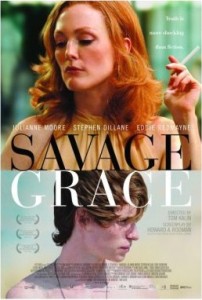
On November 11, 1972, Barbara Daly Baekeland was murdered by her 25 year old son, Antony, in their London home. Not just “any” murder, this one garnered international attention as Barbara was not just “any” wealthy socialite. She was the ex-wife of Brooks Baekeland, grandson of Leon Baekeland, founder of Bakelite plastic, a product found in almost every home in the industrialized world. And just for good measure, let’s toss in a familial history of lurid, lewd, tawdry and incestuous sexual conduct, making the story ripe for the press, ripe for publication and now, ripe for the big screen.
Barbara Daly was a vivacious, sexy, charming, wannabe/sometime actress and model who always had her eye on the prize. What prize you ask? Well, quite frankly, any prize, as long as it would bring her great wealth with all its trappings and make her the center of attention. In this case, Barbara’s prize was Brooks Baekeland, heir to the Bakelite company and fortune. What one would describe as “ a real looker” with charm, allure and air of refinement, it took little effort for Barbara to wend her way into Brooks’ heart and home. Unfortunately, Barbara was psychologically unstable, ill-bred and despite outward appearances, on opening her mouth, could be counted on to be the rudest, most foul-mouthed, classless person in a room. As if alienating Brooks (not to mention his family and friends) with her conduct wasn’t bad enough behavior, her libertine lifestyle of excessive drink, a modicum of drugs and risque-over-the-top sexual encounters of a variety of natures with seemingly anyone and everyone she could find, pushed him into the arms, and beds, of countless of other women.
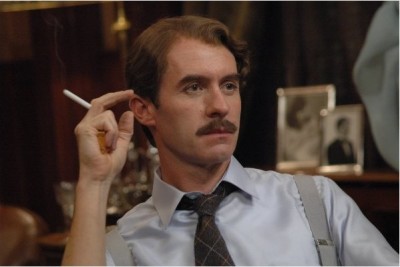
Seeing the handwriting on the wall, Barbara tries to “clean up her act” and not only keep her husband at home, but keep him as her husband period and in 1946 she takes a stab at being the dutiful wife by producing a son for Brooks. A beautiful, porcelain child, Antony, or Tony as he is called, is the apple of his mother’s eye but nothing more than a “distant relation” to his father. Instead of bringing the family closer and resolving deep seeded psychological and social issues, Tony only adds fuel to the fire. Barbara obsesses over him while Brooks drifts further away, sensing something “isn’t right” with Tony or Tony’s relationship with his mother.
Living a continental life in London and Paris, by age 12, Tony’s sexual proclivities and tawdriness appear to be mimicking those of his mother. Brooks is convinced his son is gay and therefore “unfit.” Beyond that, schizophrenic tendencies are overtaking any sense of normality in the child. Mortified by these accusations and herself in denial, Barbara begs Brooks to allow Tony to see a psychiatrist to clear his head, an avenue unbefitting the likes of a Baekeland and a method which Brooks decries and refuses to permit.
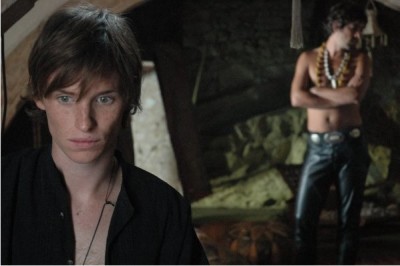
As time progresses, Barbara’s instability, violent outbursts and erratic and erotic behavior increase, as do her sexual dalliances, as she coerces girls to have sex with Tony in an effort to prove to Brooks (and let’s face it, herself) that Tony is “normal”. Brooks, now completely disenchanted with Barbara and Tony, makes his own changes in an effort to have some degree of normalcy and stability. And Tony, well Tony is his mother’s puppet and pawn. With his own inner rages, eroticism, violence and manipulative manners taking hold and Barbara fighting for her own continued co-dependence on Tony, she ultimately seduces her own son in an attempt to not only keep him for herself, but to “cure” his gayness.” But her cure backfires and Antony stabs her with a kitchen knife.
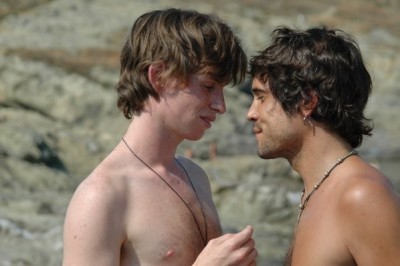
Calling the police himself, Tony is found in their London home sitting on the floor next to his mother’s lifeless body – ordering Chinese food.
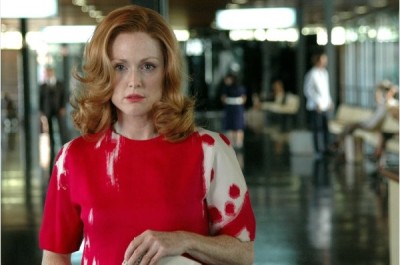
Julianne Moore is an emotional chameleon. She needs no costumes, no set. She can morph into any persona, time, space or place with just her emotional palette leading to a satiatingly mesmerizing performance. Luminous and beauteous, as Barbara, she fills the screen with enigmatic energy and emotion, lending to the complexities of the character. With a vibrancy and depth that balances the delicacy of the psychological tightrope walked by the real Barbara Baekeland, with clipped delivery befitting her “wanted station in life” she breathes intrigue and understanding into the character that neither trial testimony, a book nor this script do justice. Exuding a raw sexuality, each scene is more emotionally provocative than the last. Her chemistry with both Eddie Redmayne’s Tony and Stephen Dillane’s Brooks is scorching. As comes as no surprise, this is another Oscar caliber performance by Moore.
With impressive, albeit few, film and theatre performances to his credit, the androgynous Eddie Redmayne is delicious. As Tony, his debaucheristic activities are often exciting and enticing with nuanced multi-textural layerings of psychoses a la Norman Bates. Unfortunately, the script doesn’t provide much psychological probing of Tony and in many areas merely skims the surface, not fully fleshing out events that superficially appear to have been extremely influential in Tony Baekeland’s ultimate fate. Tackling a true story and portraying a real person is daunting enough but to have the added psychosexual abnormalities forces a more accomplished tapestried work if the performance is to be believed and connectable. On this level, Redmayne excels.
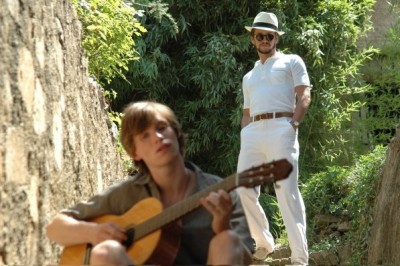
As Brooks, Tony award winner Stephen Dillane is the perfect counterpart to Julianne Moore. As Brooks, his performance is calculating with controlled emotional outbursts piquing at just the right moment to make one jump in their seat. Theatre trained at the Old Vic Theatre School in London, Dillane breathes an air of faux-sophisticated aristocracy into Brooks that serves as a double-edged sword to Brooks’ inner desires and familial and social pressures. And while the end result is not as engrossing as the performance by Moore, it is nevertheless solidly fitting the character.
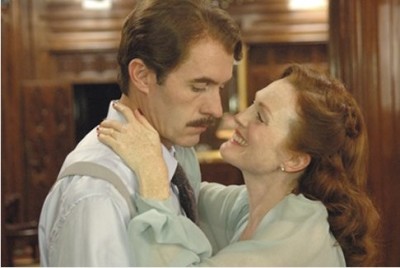
Written by Howard Rodman based on the book by Natalie Robins and Steven Aronson, Barbara Baekeland’s story is well-enough adapted for the big screen, but disappointingly often leans towards the sensationalistic and perverse, sacrificing richer character development. At the end of the film I was still left wondering, how Barbara Baekeland developed the psychosexual problems and violent tendencies that led to not only her demise and that of her son. There is no explanation and for the behavioral patterns here, the film and the characters cry out for more.
Tom Kalin returns to the director’s chair after a 15 year absence. A daring character study of abstract perversion based on true events, Kalin utilizes the camera as an aid to developing the emotional erraticism of the characters but has a fluidity that counter-balances the story itself providing an intimacy for the audience. Calling on cinematographer Juan Miquel Azpiroz, the lensing is crisply vibrant showcasing the eras and European locations to their finest. Particularly breathtaking are the scenes in Catalonia. Notable is the detail and delicacy with which sexual encounters are lensed with each scene noticeably and appropriately lit for the parties involved and the emotion raging at the time. This is a nuance many may miss but shouldn’t. It speaks volumes as to the talents of Azpiroz and Kalin.
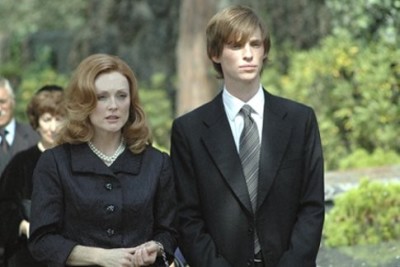
Andfor those of you not familiar with the original events and media circus back in ‘72 and who are wondering what happened to the Baekeland’s after Barbara was stabbed in the kitchen, make sure you stay for the credits. The epilogue will prove that the Baekeland’s give new meaning to the term “dysfunctional family.”
Visually stunning and performance driven, SAVAGE GRACE has a carnal savagery that will ravage sensibilities and senses.
Barbara Baekeland: Julianne Moore Brooks Baekeland: Stephen Dillane Tony Baekeland: Eddie Redmayne
Directed by Tony Kalin. Written by Howard Rodman based on the book by Natalie Robins and Steven Aronson. Rated R.











